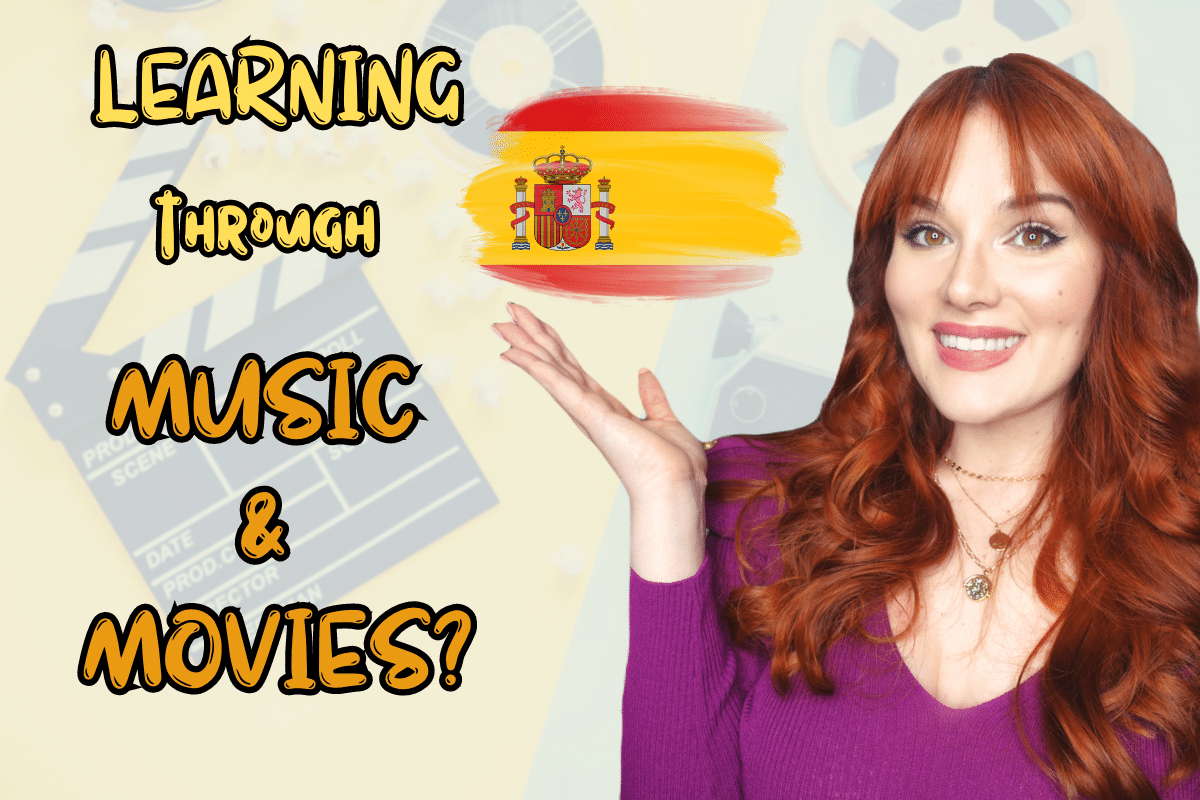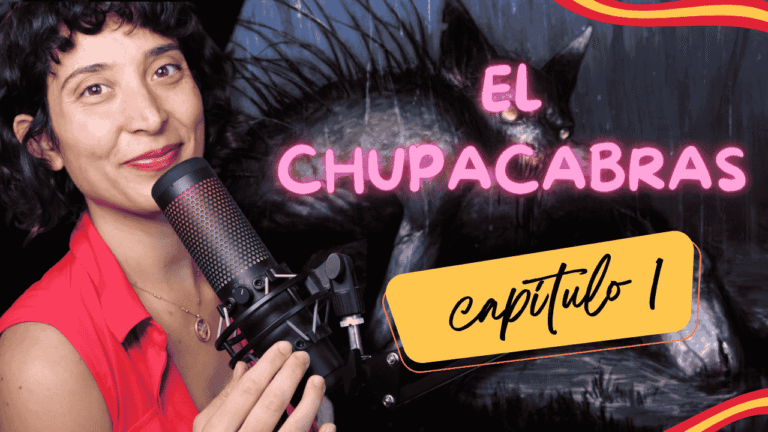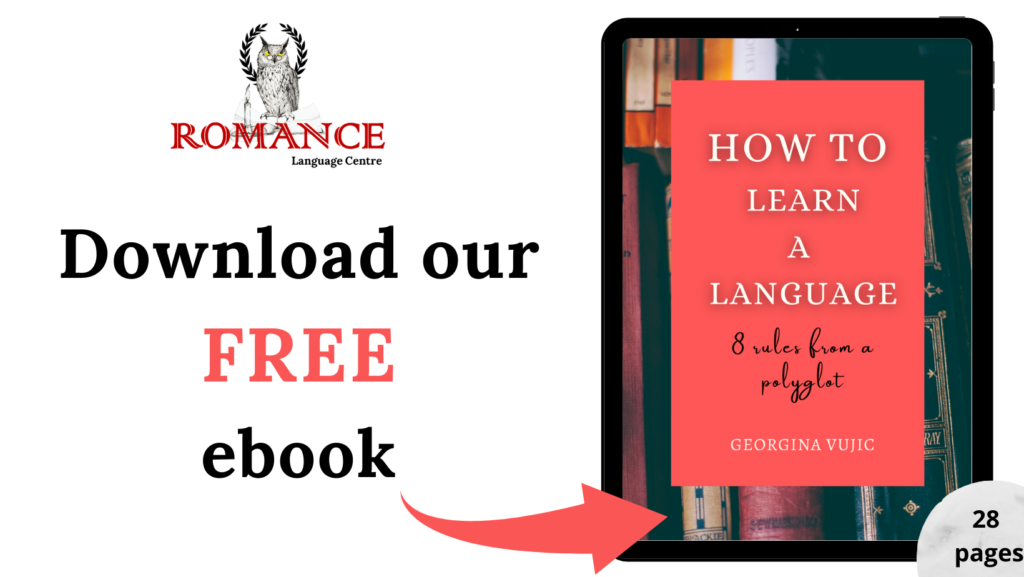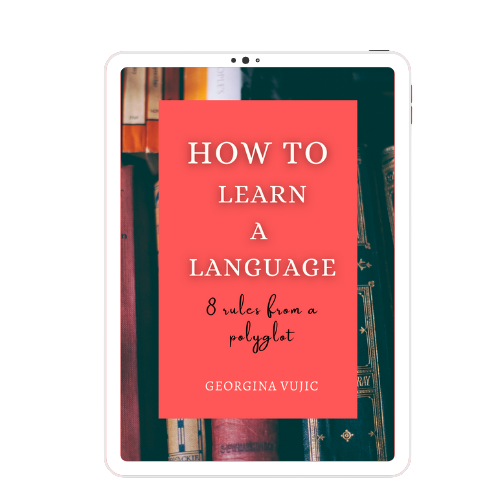To learn Spanish can offer endless opportunities and rewards! From easier communication with native speakers to unlocking doors for travel and career prospects.
But let’s be honest, relying solely on traditional methods can be a bit dry and ineffective at times. That’s why many people are now seeking engaging and fun alternatives to master the language, such as watching movies and listening to music.
However, a question remains: Can learning Spanish this way help you build your vocabulary, grammar, and syntax? Can you actually learn Spanish solely through music and movies?
In this article, we explore the merits and drawbacks of using movies and music to learn Spanish. By the end, not only will you have answers, but you’ll also have a clearer idea if this method suits your learning style and goals. So let’s dive in!
BENEFITS OF USING MUSIC AND MOVIES

PRONOUNCIATION AND RECOGNITION OF WORDS
Listening to music and watching movies is an excellent way to get familiar with your target language. Not only does it make learning Spanish more enjoyable, but it also allows you to become more familiar with the sounds of the language and its pronunciation. Every language has a unique “sound” that you must pick up. This is especially important because familiarizing your ears to linguistic sound patterns is one of the first steps towards fluency.
When you first start learning Spanish, your brain is not capable of separating nor recognizing phonetic groups as individual words. It all sounds like a jumble of unintelligible sounds. This is when reading and studying of vocabulary are most beneficial, but listening comes close second.
AUTHENTIC CULTURAL RESOURCES
Movies and music offer a wealth of vocabulary and expressions that you may not encounter in traditional classrooms. However, many language courses can become rigid and prescriptive due to reliance on few textbooks and following strict curricula. Adherence to such curricula risks leading to rote memorisation and tight, sterile expression.
Instead, consider adding to your Spanish education a bit of cultural media to enrich and diversify your language experience. This will bring real-world context to your studies and foster genuine fluency.
It is crucial to remember that language is not confined to textbooks. Rather, it is expressed among people from various backgrounds and ages – in art, music, and daily life. This is particularly profound when considering Spanish, which is spoken around the globe by individuals of diverse cultures and ethnicities.
Exposing oneself to a range of authentic contexts is vital when learning Spanish. Movies and music are an incredible means of assimilating idiomatic expressions, understanding native colloquialisms used by different age groups and different countries in varying situations. They also provide valuable insights into different cultures, thereby enabling better comprehension of the language. For instance, movies like Pan’s Labyrinth or Witching and Bitching can aid Spanish students by kindling their fascination for historical significance in two cultural contexts – the Spanish Civil War and the superstitious beliefs in Northern Spain.
FUN AND INTERACTIVE
Additionally, music and movies can provide a fun and interactive way to practice speaking, as you can imitate the way characters pronounce certain words and phrases.
Furthermore, it is hard to come by students who do not find listening to music and watching movies entertaining. Find your preferred genre or be open to trying fresh ones. Use them as a means to remind yourself of why you’re striving for fluency and why you have chosen Spanish of all languages. Though the journey to mastering a language can be daunting at times, keep your passion for learning Spanish alive and envision your aspirations coming to life through music and movies.
HOW TO USE SPANISH MOVIES AND MUSIC TO AID YOUR LEARNING
When using movies and music to effectively learn Spanish, there are a number of steps that can be taken.
Firstly, it is important to find content that is suitable for your level.
If you are a beginner, look for films and songs with simple language and concepts. As your Spanish improves, you can move on to more complex content. Secondly, it is beneficial to watch the film or listen to the song multiple times, in order to really get to grips with the language.
When watching films, turn on the Spanish subtitles in order to understand the dialogue and pick out key words and phrases. Additionally, it is a good idea to combine the use of movies and music with other Spanish-learning activities in order to ensure you are expanding your language knowledge in multiple areas.
Finally, if you are having trouble understanding what you are watching or listening to, try to look up the words and phrases you don’t understand. This will help to build your Spanish vocabulary and give you a better understanding of the language.
HOW TO LISTEN TO SPANISH SONGS
In our classroom, listening to songs has a specific order and structure that you could employ yourself. We first listen to songs by focusing on sounds, rhythm and intonations. This is an opportunity to enjoy the music, too, because the enjoyment cannot be lost in the process of learning.
Second time listening, we look at the lyrics and notice how the individual words are pronounced. Tutors always leave out a few key words appropriated for the level to further help train the student’s ear.
After the third listening, we analyse the meaning of the lyrics to help the brain link the unfamiliar words to meaning which will greatly improve retention. Lastly, you can learn to sing the song yourself which is what our students sometimes choose to do as a side project.
Although learning Spanish with music and movies can be a fun and enjoyable way to improve language skills, there are some factors to consider before solely relying on these mediums.
DRAWBACKS OF MUSIC AND MOVIES
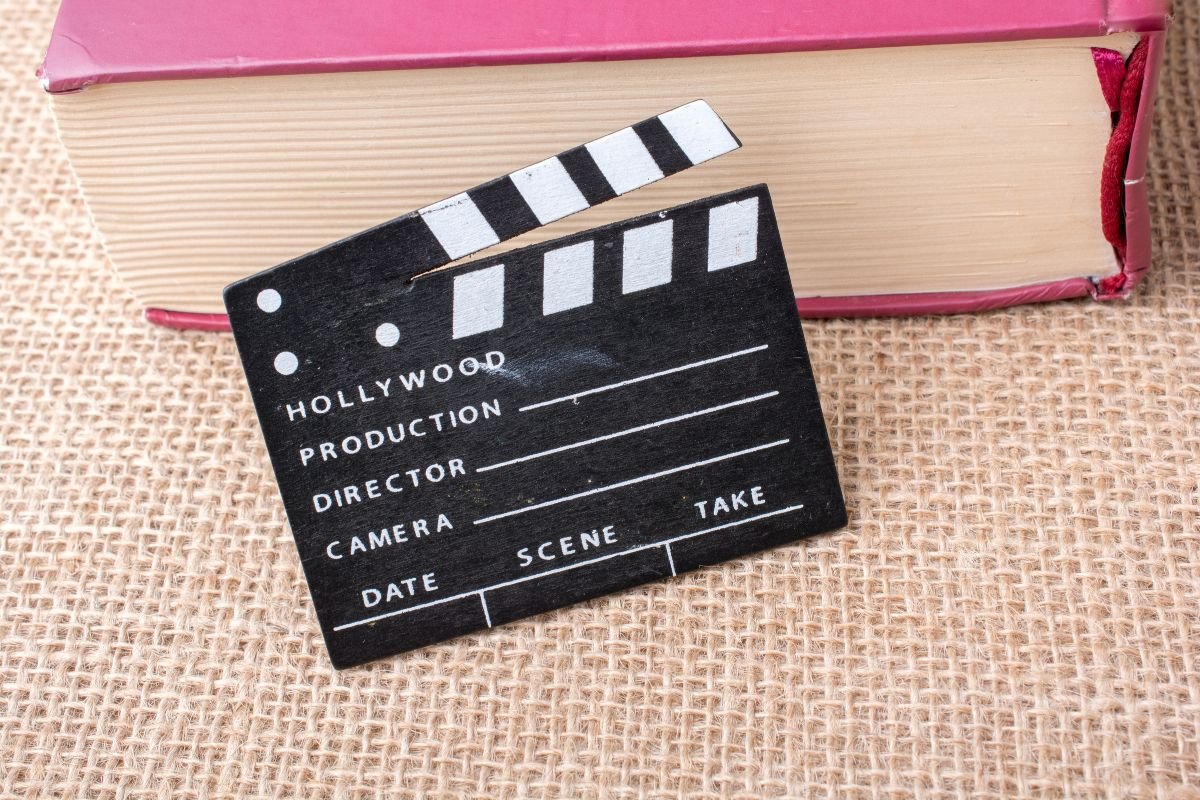
APPROPRIATE LEVEL
For one, it may be difficult to find movies or songs that are at an appropriate level for your specific skill set. This is because excessive amounts of noise can make it difficult to concentrate and process the language that you’re trying to learn. In addition, too much or too loud audio input can cause feelings of anxiety or frustration which may interfere with your ability to absorb new material.
Most importantly, it is crucial for input to be comprehensible to optimize your learning and to avoid getting lost and picking up random, sometimes erroneous patterns and expressions. Proposed by Stephen Krashen, comprehensible input suggests that language acquisition occurs when learners are exposed to language that is slightly above their current level of proficiency. This input should be understandable, interesting, and relevant to the learner’s needs and interests. According to Krashen, this type of comprehensible input is the most important factor in second language acquisition, as it allows learners to unconsciously absorb new language structures and vocabulary without focusing on grammar rules or memorization.
Problem is, how do you achieve this when you are a beginner? Even so, how do you target that “slightly above current level of understanding” level alone?
TOO CHALLENGING
While music and movies can be great for learning Spanish in a contextual way, it can be hard to understand the subtleties and nuances of Spanish grammar without additional resources like textbooks or workbooks.
Additionally, the use of slang in music and movies can make it more challenging to understand the full meaning of phrases and words.
Moreover, it is important to remember that music and movies will not comprehensively cover all aspects of the Spanish language and may instead focus only on particular dialects and vocabulary.
MUSIC AND MOVIES ALONE CANNOT MAKE YOU FLUENT
Movies and music alone are not enough to learn Spanish as they don’t cover all the facets of the language. Besides the problem of lack of comprehensive input and limitation of context and lack of guidance, there’s other problems that present itself when relying solely on music and movies to learn a language.
The biggest and hardest part of learning Spanish is learning how to be independently functional in a variety of context and in all four skills – writing, speaking, listening and reading.
While watching movies is an entertaining and engaging way to expose oneself to Spanish, it may not suffice when it comes to acquiring the language skills. There’s a lot more to mastering a language than just being able to follow a storyline. You need to understand the nuances of grammar and syntax, build a robust vocabulary, and hone your conversational skills to become an adept speaker.
Listening to Spanish music can make learning the language less monotonous while providing an intuitive understanding of the language’s sounds and rhythms. It’s a fantastic way to get a sense of the language and build up your foundation. Nonetheless, to become proficient in speaking the language, exposing yourself to a breadth of vocabulary and complex grammar rules is indispensable.
Remember that at no point during watching movies or listening to music would you be trained to extract patterns, learn the meaning of them, and most importantly, be able to apply them on your own outside the context of the movie or song.
In order to progress to a level of fluency, you should also consider activities that involve reading, writing, speaking and listening exercises. Flashcards, language learning apps, reading Spanish literature and attending classes are just some examples of additional tools and methods that can help you on your path to fluency.
In conclusion, the use of movies and music can certainly prove to be incredibly helpful resources when learning Spanish. They provide a fun and enjoyable way to pick up basic knowledge of the language, as well as introducing you to new vocabulary that you may not learn in a traditional setting.
However, relying solely on these methods alone may not be enough to become a proficient Spanish speaker. To truly understand the language and its nuances, incorporating other learning tools such as textbooks, tutors, and language courses can help you grasp the fundamentals of the language and gain fluency in real-life communication.
By combining movies and music with these other learning tools, you can create a comprehensive strategy to learn Spanish and make the most out of your study sessions. With this approach, you can gradually become a confident and fluent Spanish speaker and open up a world of opportunities for personal and professional growth, both on a local and global scale.
LEARN SPANISH THROUGH MOVIES AND MUSIC WITH ROMANCE

Are you a curious, serious, hard-working and committed learner who wants to learn Spanish long-term but you don’t know where to start nor whom to believe?
You’ve wasted money on crash courses and language apps, spent years “picking up” Spanish, doing language exchanges, immersing yourself, and paying “repeat after me” tutors, yet you still struggle to use it functionally and effectively?
Maybe you spend hours listening to music and watching movies in Spanish, but none of it ever really sticks?
You think there is something wrong with you if you are not fluent after a year?
You lack structure, continuous support and confidence?
Maybe you just want expert guidance and honest, regular feedback?
If you can relate to our students, maybe we could be just what you are looking for and as we open our 2023 enrolments, let us show you how learning occurs RLC!
We are not for everyone, but we might be just for you!


